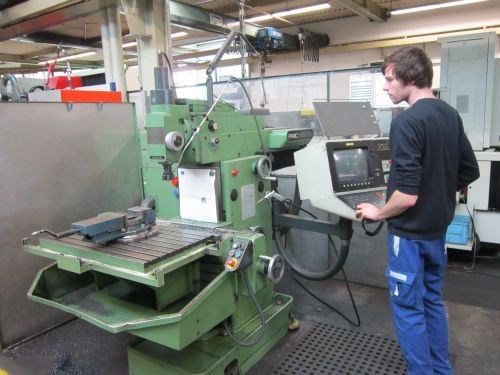An Infrastructure for Talent
In Germany, the education system is set up in a way that supports the country’s manufacturers. Although the same can’t be said for the U.S., a similar model is already catching on—and delivering results—in at least one state.

A Heck and Becker apprentice works at an older machine in the training area.
When I visited Frankfurt, Germany back in December, I had the opportunity to take a day away from the Euromold trade show to visit two manufacturing plants: Heck and Becker and Meissner AG. Aside from the fact that both service the automotive industry, these companies are very different. However, when asked about what separates them from their U.S. counterparts, both were quick to cite an education system that churns out a steady stream of talented young people who are eager to enter skilled trades like manufacturing.
In contrast to attitudes I’ve encountered here in the states, I’d guess most Germans don’t to subscribe to the idea that “success” requires a bachelor’s degree, nor that manufacturing is somehow “low-brow” work. Otherwise, I’d bet companies like Heck and Becker and Meissner wouldn’t be able to tell me that in any given year, apprentices make up as much as 10 percent of their total workforces. Starting in what we would consider high school, these teens split time between classroom and the plant, as described in this article. Although manufacturers themselves bear much of the cost of this years-long training, both say the commitment is more than worth it.
Notably, recent developments closer to home suggest U.S. shops feel the same way, at least in one state. This year, the seven industrial partners that make up the new North Carolina Triangle Apprenticeship (NCTAP) program will take on their first apprentices. Similarly to their German counterparts, these kids will split time between school and the shop for about four years. At that point, they’ll have a guaranteed job, industry-recognized credentials and years of experience under their belts, all without spending a dime. NCTAP organizers are quick to emphasize that much of the groundwork for then new initiative was laid by Apprenticeship 2000, a similar, Charlotte-area program that has graduated more than 70 percent of its apprentices since its founding in 1996.
Stay tuned for more on NCTAP. The organization will be the subject of a profile article in our May issue, which is set to hit the streets next week. Specifically, we’ll view the program through the lens of Superior Tooling, a mold manufacturer in Wake Forest. Meanwhile, read this article for more detail on how Heck and Becker benefits from the European model that forms the basis for programs like NCTAP and Apprenticeship 2000.











